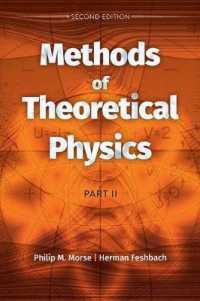- ホーム
- > 洋書
- > 英文書
- > Philosophy
Full Description
In The Metaphysics of Chinese Moral Principles, author Mingjun Lu seeks to construct and establish the metaphysics of Chinese morals as a formal and independent branch of learning by abstracting and systemizing the universal principles presupposed by the primal virtues and key imperatives in Daoist and Confucian ethics. Lu proposes that the metaphysical foundation of Chinese moral principles, as reinstated in this book, brings to light not only the universality of its core values and ideals but also a pivotal though hitherto neglected key to the enduring vibrancy of a civilization that has lasted several millennia.
Contents
Acknowledgements Introduction 1 The Necessity of Joining Morals to Metaphysics2 The Consequences of Joining Morals to Metaphysics3 The Argument, Methodology, and Objective of the Project4 Significance of the Project-Metaphysical vs. Other Readings of the Chinese Moral System5 Plan of Studypart 1 A Comparative Approach to the Metaphysics of Chinese Moral Principles 1 The First Principle in Chinese Moral Metaphysics The Law of Nature or Innate Nature 1 The First Principle in Chinese Moral Metaphysics: The Law of Nature or Innate Nature2 The Metaphysical Foundation of Chinese Morals3 The Morality of Innate Nature in Mencian and Aristotelian Ethics4 The Shared Metaphysical Foundation of Good and Evil5 Conclusion2 The Aristotelian vs. Kantian Approach to Chinese Moral Metaphysics 1 The Aristotelian Approach to the Metaphysics of Chinese Morals2 Problems with Mou Zongsan's Kantian Approach to Confucian Metaphysics3 Key Divergences between Confucian and Kantian Moral Metaphysics4 The Kantian and Confucian Conceptions of Morality: The Deontological and the Natural5 Conclusion3 The Metaphysics of the Moral End and Standard in Chinese and Aristotelian Teleological Virtue Ethics 1 Aristotle's Teleological Virtue Ethics2 Confucian Teleological Virtue Ethics3 Zhongyong as a Metaphysical Principle and Moral Standard4 Zhongyong versus the Aristotelian Mean5 Conclusionpart 2 The Metaphysics of Daoist and Confucian Moral Virtues 4 Metaphysical vs. Temporal Virtue in Daoist and Confucian Morals 1 The Dao and Its Metaphysical Virtue2 Zhuangzi on the Relation of Morals and Metaphysics3 The Dao and Virtue in the Analects 4 Metaphysical and Temporal Virtues in the Yi Commentaries5 Conclusion5 The Metaphysical Foundation and Moral Cosmopolitanism of ren or Benevolence 1 Chinese and Western Moral Cosmopolitanism2 Ren as the First Principle in Confucian and Mencian Ethics3 Cosmopolitan Benevolence in Daoist Philosophy4 Cosmopolitan Benevolence in Confucian and Mencian Ethics5 The Mind of Cosmopolitan Benevolence in Neo-Confucian Philosophy6 Benevolence and the Evil of Desire7 Conclusion6 Yi or Justice/Justness as a Moral, Metaphysical, and Methodological Principle 1 Original Goodness and the Dao of renyi 2 The "Grand and Vital Force of Justice" and Its Temporal Manifestation as the Dao of renyi 3 Jiyi (Accumulated Justnesses) as a Methodological Approach to Justice4 Two Key Barriers on the Path of Yi : Desire and Self-interest5 Conclusion7 The Metaphysical Root and Ethical Republicanism of Chinese liyue or Ritual and Musical System 1 The liyue System and Its Moral Scheme in the Zhouli 2 The Metaphysical Foundation of the liyue System3 The Moral Implications of liyue in Confucian Ethics4 Liyue as an Institutionalized Means of Governance5 The Rule of liyue and the Rule of Law6 Chinese vs. Roman Ethical Republicanism7 Conclusion8 Metaphysical and Moral Knowledge in Chinese zhi or Wisdom 1 The Wisdom Obtained by xuanjian (the Metaphysical Mirror)2 Zhi as Knowledge of Universality and the Innate Conscience3 The Prudential Wisdom of zhizhi (Knowing Boundaries)4 Conclusionpart 3 The Metaphysics of Chinese Moral Imperatives 9 Confucian cheng or Truthfulness Cheng as the Dao of Heaven and the Dao of Man 1 Cheng as a Metaphysical Concept in Confucian and Daoist Philosophy2 Cheng as a Methodological Approach to zhongyong 3 Cheng (Truthfulness) and xin (Honesty or Trustworthiness) in the Analects and Mencius 4 Cheng and Moral Cultivation in the Great Learning and Zhongyong 5 Cheng (Truthfulness) and jing (Respect)6 Conclusion10 The Law of Return and Self-Reflection The Freedom and Autonomy of the Confucian Self 1 The Daoist Law of Return and Its Moral Implications2 Confucius on Self-Reflection and Self-Critique3 The Self in Mencius's Moral Imperatives4 The Metaphysical Foundation of the Self in Neo-Confucian Philosophy5 The Moral and Epistemological Freedom and Autonomy of the Confucian Self6 The Epistemological Agency of the Reflexive and Self-Correcting Self7 ConclusionEpilogue References Index






